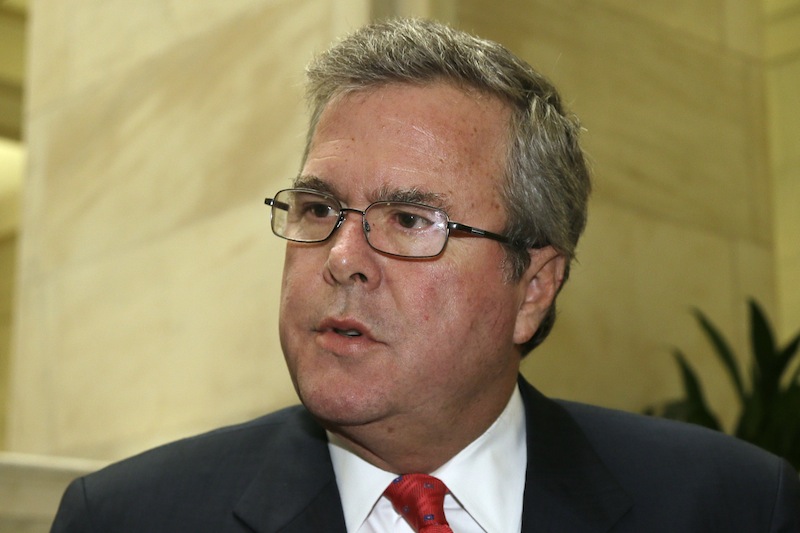If Jeb Bush is going to run in 2016 as the party’s savior with Latino voters, his latest immigration proposal could be a problem. According to the latest survey by polling firm Latino Decisions, Hispanic voters are heavily invested in a path to citizenship and more focused than ever to immigration reform.
The survey of 800 registered Latino voters was taken over a two week period in February before Bush’s new book outlining his proposal was released. It was sponsored by SEIU, America’s Voice, and the National Council of La Raza, three groups lobbying for immigration reform, and has a margin of error of +/-3.5 percent.
One question asked respondents whether they would be more or less inclined to vote for a politician depending on their support for a path to citizenship. Some 44 percent said they were more likely to vote for a “Republican candidate in the future if Republicans take a leadership role in passing comprehensive immigration reform including a pathway to citizenship,” while 8 percent said they would be less likely and 42 percent said it would make no difference.
The numbers were about what you’d expect when the question was reversed: 42 percent said they were less likely to vote for a Republican who “take[s] a leadership role in blocking comprehensive immigration reform or work[s] to block the option for a pathway to citizenship” versus 14 percent who said they were more likely and 37 percent who said it wouldn’t make a difference.
The poll also tested a hypothetical head-to-head election between a Democrat whose platform reads “we are a nation of immigrants, and we can’t just deport 11 million people. Let’s work together to find a way to provide a path to citizenship for undocumented immigrants” and a Republican who says “we are a nation of LEGAL immigrants.Those who came here illegally have broken the law and we are not going to reward them with citizenship.” 72 percent of respondents said they’d vote for the Democrat, versus just 18 percent for the Republican.
That’s not particularly surprising — Romney’s Latino support crashed to historic lows in 2012 after he backed the second position. Much more interesting is how many Latino voters said they’d vote for a Republican over a Democrat if the two statements were reversed. By a 63-28 margin, respondents said they’d support a pro-citizenship Republican in a race against an anti-citizenship Democrat. That finding could lend weight to Republicans like Bush and Marco Rubio who have argued that immigration reform is a necessary prerequisite to courting Latino voters.
Helping to explain this huge swing is the Latino community’s newfound focus on immigration issues: 58 percent of respondents listed “immigration reform” as their top priority for Congress and the president this year, easily beating the next highest scoring answer, “the economy,” which 38 percent named most important.
While immigration was a key issue in the 2012 election, this represents a significant swing in a short period. An earlier Latino Decisions poll on the eve of the 2012 election found 50 percent listed “create more jobs/fix the economy” as the most important task for political leaders versus just 35 precent who listed “immigration reform/DREAM Act.”
Republicans have their work cut out for them when it comes to winning back Latinos, however. Respondents said they had a favorable view of President Obama by a 77-21 margin, including 56 percent who had a “very favorable” impression. For Democrats in Congress, the margin was 64-25. Republicans in Congress lagged way behind with a 31-53 rating, which is far behind the Democrats but actually a lot better than they do in many national polls. Only 7 percent had a “very favorable” view of the GOP Congress, however, versus 32 percent who had a “very unfavorable” view.






